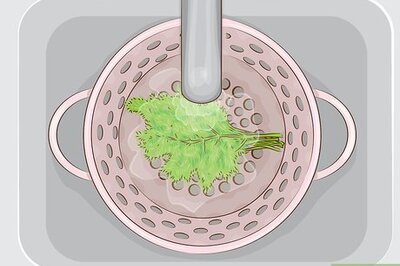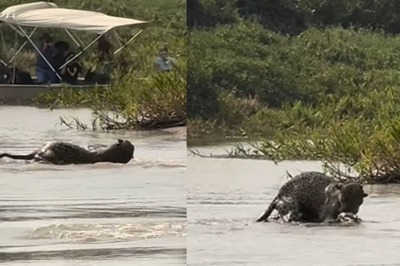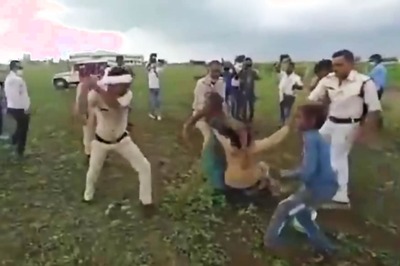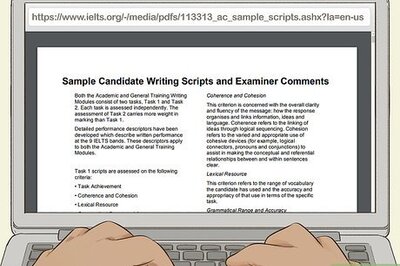
views
Suhasini Haider: President Pervez Mushrraf is a General, a head of state, a man of many parts. We are going to find out more about President Musharraf, the family man. We are speaking to Begum Zarin Musharraf, who is his mother, and Begum Sehba Musharraf, the First Lady.
Suhasini Haider: Begum Sehba, I'd like to start with you. You married a fauji, a man in uniform, was it a surprise for you to find yourself married to the President of Pakistan.
Begum Sehba: It was certainly very shocking and it gave me quite a few scares.
Suhasini Haider: I am sure with the kind of security he has, it still gives you scares.
Begum Sehba: You know the kind of incidents that he had to face makes me worry a lot.
Suhasini Haider: We spoke to General Pervez Mushrraf earlier and Begun Zarin, he said that you had always wanted him to join the army. Why was that?
Begum Zarin: That was because I liked the uniform. I liked people in the army, they looked so smart. He always had the qualities of a leader in him. He was not very much focussed in studies, to tell you the truth. But he was very good in mathematics, he used to always top in mathematics. But he was meant to be in the army and be the leader of the nation. That is what I thought.
Suhasini Haider: Tell us more about what he was as a child. Did he give any indications that he would one day lead Pakistan?
Begum Zarin: He had those qualities. He was always the leader of the group. When he was a young boy of seven or eight, he used to decide what to play and what not to miss. He was always a leader.
Suhasini Haider: He was very young, but he did spend some time in Delhi. What are your memories of India of those times, before you left and partioned?
Begum Zarin: He was just about six or seven years old then. They had already joined a school there. It used to be called English Comparative School or something like that. They were already going to school already and they had their friends and it was a nice time.
Suhasini Haider: Did you miss India, to begin with, when you moved to Pakistan?
PAGE_BREAK
Begum Zarin: Yes, I did miss Delhi. We belong to Delhi. Now, ofcourse, we are Pakistani. But we are originally from Delhi.
Suhasini Haider: And you went back, with your grandson last year. I remember watching videos of how you were greeted by crowds everywhere, practically mobbed at places. Tell us about that visit.
Begum Zarin: They were very kind. Ofcourse they greeted me and welcomed me. I think it was very nostalgic stay there. It was after '82 that I had gone there. I went to Aligarh also. I went to Abduallah lodge and stayed there for some time. I also went to visit my old college in Delhi. It is a university now.
Suhasini Haider: You were one of the few in that generation to have gone through college.
Begum Zarin: Yes, we were only ten Muslim girls at that time.
Suhasini Haider: Begum Sehba, you went to India with the President and then, you went to Agra. That was a period of intense negotiations with India that he was taking, with were eventually unsuccessful. Was it a tense time to be there with him?
Begum Sehba: Yes, it certainly was. I remember saying how come it didn't work out. Unfortunately, at that time my prayers weren't answered. But yes, it was a tense time.
Suhasini Haider: You went to the Taj with him as well. Just recently, the US President and the First Lady were in New Delhi and we heard Prime Minister Manmohan Singh sort of teasing Laura Bush about the fact that her husband hadn't taken her to the Taj. Is that something that came up with your discussions with the US First Lady?
Begum Sehba: No, we didn't discuss that part of it. Frankly, I didn't know that he said so during the India visit.
Suhasini Haider: I am sure many of our viewers are very curious. When two First Ladies of two countries as disparate as India and Pakistan meet, what do you have in common? What do you talk about?
Begum Sehba: We speak about societies, about our families and about the world situation at times, but not from a political angle. It is more as one human being to another. I think that is what it basically is. And that also as one female to another. I think the focus is on those things.
Suhasini Haider: I know that one of the things that she spoke about when she was here was education, specially girl child education. Now, this is a subject that you get quite involved in.
PAGE_BREAK
Begum Sehba: Yes, I believe in encouraging any government initiative and I am always a sport whenever they make any of these moves and I have always said that I am available whenever you need me. The way she spoke about education was when later on she came to see us, she met some of the women representatives from the assembly as well as some of the women ministers. They were from the coalition. She had a very broad perspective because they all spoke of what their own experiences were, what their knowledge was and what their arears were about. So, she had something of a good exposure, I'd say.
Suhasini Haider: Begum Zarin, as you said, you were among the few girls who went to college so many decades ago. Yet even today in Pakistan,
female literacy is very low, it is at a 26 per cent. What do you think needs to be done?
Begum Zarin: Well, things are being done. These days, girls can be seen in every field - engineering, doctors, pilots and these days, girls are highly educated. They know that they have to study and obtain education.
Suhasini Haider: Begum Sehba, if we can talk about the October earthquake. We saw videos and pictures of you going to the earthquake hit sites. We even saw you donating blood. Tell me about your experiences, when you first saw the devastation in the North.
Begum Sehba: To begin with, that area is lush green area and because of the earthquake, the water channels seemed to have dried up and it had become quite barren looking. It was a sad thing to see. I had been there with my husband nearly 30 years ago and at that time, and the greenery was something to see.
That is what saddened me immensely. And then, the effect on the women and children was very heart-rending because the women seemed to be in a terrible state of shock. They were just sitting with blank faces. But the heartening thing was the way the children wanted to put it behind them immediately. They would give us big smiles. They had lost so much and yet, they were there smiling for us and trying to respond in any positive way. That was encouraging.
Suhasini Haider: Do you keep going back there?
Begum Sehba: I haven't had the opportunity quite frankly. That is because I only move around with my husband and whenever he gets an opportunity, I do hop along and go along.
Suhasini Haider: We do see a lot with him. How often do you give him suggestions or advice?
PAGE_BREAK
Begum Sehba: I don't think that he needs it because he is a very practical person. I have noticed that all our life I tend to be less focused on what needs to be done. He is more aware of the, let me say the 'how tos'of things. I remember, when we were young, people used to say that he is very clear-headed. That is because if you relate something to him, he will at once, you know think about it in a very sequential manner, all the way down the line. He would 'think things through', if you know what I mean. So, he has been very good with it and I didn't have to give him any advice, frankly.
Suhasini Haider: We spoke to him and he said that you were a very sobering influence on him, that he was a rash man before.
Begum Sehba: He is a little impulsive and I used to try and hold him back.
Suhasini Haider: Tell us more about him in his youth. Now, ofcourse, we see him as a President and the General.
Begum Sehba: He has always been very active and very fond of sports. He's start the morning with a lot of exercise, PT and all, you know. Then come back and go to office and then again, when he'd be back in the evening, he would go for games. I remember my father telling me, "Beta ise roko, he will break all the bones in his body."
But I said if it is a part of his make up and if it is a part of his nature, then I can't do a thing about it. He has to do what he has to do. This is how we were during the initial years of our marriage and we followed a pattern like that. Even when we were in the small places in Pakistan, he would follow that.
Suhasini Haider: Begum Zarin, President Mushraff is written about endlessly in papers not just in Pakistan, but also in the US and in India. Do you sometimes feel that he is a misunderstood man?
Begum Zarin: Yes, he is rather misunderstood. He is a very frank person and whatever he says, he means it.
Suhasini Haider: He told us that you were a very big influence in his life.
Begum Zarin: Perhaps, if he says so.
Suhasini Haider: Has he been a good son?
Begum Zarin: Yes, he has always been a very good son. He has always cared for me. He's got a short temper though. I have three boys and he is the one who is meant to be in the army. He was the type that he should go to the army.
Suhasini Haider: Begum Sehba, he has an extremely tense job. Does any of that tension come home?
PAGE_BREAK
Begum Sehba: No, not really. He does not try to carry the baggage of whatever happens. I think he is always thinking ahead of what needs to be done. He is always focussing on issues and when he does relax, like over a game of bridge. These days he plays a lot of tennis.
Suhasini Haider: What do you as a family do to relax?
Begum Sehba: Family get togethers are few and far between. We go to Karachi sometimes, our daughter is there. She comes along with her daughters and we have a lot of fun with them. There are too many things and very limited time always. He has to get back to work and for that needs his space.
We can't intrude on that and I don't believe we should, because I also believe that the window for opportunity is always small. We have to give it our best shot in whatever time available. So, if the responsibility is very huge, it's humongous, he has to focus on what he has to do.
Suhasini Haider: As a wife in the army, you would have looked ahead to retirement. The peace and quiet and tend the garden sort of a thing. Do you ever see that?
Begum Sehba: The work to be done is too much, so I don't reflect on things like that. I just think that the work should be complete and it has to be done in the best possible manner.
Suhasini Haider: In India, one of the most popular serials is Kyunki Saas Bhi Kabhi Bahu Thi. It is a serial that is basically between the mother-in-law and the daughter-in-law, - I see that you are both wearing the same colour - is there ever a sort of tension between the two of you?
Begum Sehba: I don't think so. But then, the seniors have their own point of view and then, we also don't always go along with what they would like us to do. But generally, we have a very good relationship.
Suhasini Haider: President Musharraf did say to us that we should ask you of what sort of a future you had seen for him. Has he come through on that?
Begum Zarin: Yes, I think so. I always wanted him to be the chief of the army. But I had never thought that he would one day be the President of the country. It is all God's bounty.
Suhasini Haider: We have a system in India - every time the Finance Minister rolls out a budget, we ask his wife to rate the budget. Could we ask you to rate your husband as the President of Pakistan?
Begum Sehba: I'd say for a country like Pakistan - 10 out of ten.
Suhasini Haider: Begum Zarin, would you agree?
Begum Zarin: Yes, I would.
Suhasini Haider: On that perfect note, I would like to thank you both for joining us here on CNN-IBN.



















Comments
0 comment